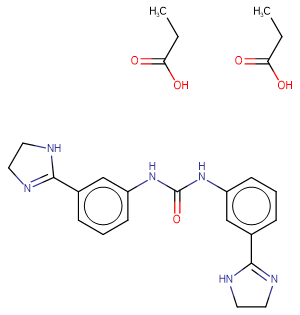
Imidocarb dipropionate
CAS No. 55750-06-6
Imidocarb dipropionate( —— )
Catalog No. M21649 CAS No. 55750-06-6
Imidocarb dipropionate is an antigenic insecticide is active against the protozoan parasite B. bovis (IC50 : 0.87 μg/ml).
Purity : >98% (HPLC)
 COA
COA
 Datasheet
Datasheet
 HNMR
HNMR
 HPLC
HPLC
 MSDS
MSDS
 Handing Instructions
Handing Instructions
| Size | Price / USD | Stock | Quantity |
| 100MG | 35 | Get Quote |


|
| 200MG | 50 | Get Quote |


|
| 500MG | 84 | Get Quote |


|
| 1G | Get Quote | Get Quote |


|
Biological Information
-
Product NameImidocarb dipropionate
-
NoteResearch use only, not for human use.
-
Brief DescriptionImidocarb dipropionate is an antigenic insecticide is active against the protozoan parasite B. bovis (IC50 : 0.87 μg/ml).
-
DescriptionImidocarb dipropionate is an antigenic insecticide is active against the protozoan parasite B. bovis (IC50 : 0.87 μg/ml).(In Vivo):Imidocarb dipropionate is administered by subcutaneous or intramuscular injection to horses (3.4 mg/kg bw) and cattle (2.I mg/kg bw). In horses, up to 4 doses may be given at 72-hour intervals. A second dose may be given 2 weeks after the first.Imidocarb dipropionate is also used in sheep (1. 2mg/kg bw) for the treatment of babesiosis and anaplasmosis.The acute oral LD50 value of Imidocarb dipropionate is in the range of 646 to 723 mg/kg bw in mice.The acute oral LD50 value of Imidocarb is in the range of 454 to 1251 mg/kg bw in rats.
-
In Vitro——
-
In VivoImidocarb dipropionate is administered by subcutaneous or intramuscular injection to horses (3.4 mg/kg bw) and cattle (2.I mg/kg bw). In horses, up to 4 doses may be given at 72-hour intervals. A second dose may be given 2 weeks after the first. Imidocarb dipropionate is also used in sheep (1. 2mg/kg bw) for the treatment of babesiosis and anaplasmosis. The acute oral LD50 value of Imidocarb dipropionate is in the range of 646 to 723 mg/kg bw in mice. The acute oral LD50 value of Imidocarb is in the range of 454 to 1251 mg/kg bw in rats.
-
Synonyms——
-
PathwayMicrobiology/Virology
-
TargetParasite
-
RecptorParasite
-
Research Area——
-
Indication——
Chemical Information
-
CAS Number55750-06-6
-
Formula Weight496.56
-
Molecular FormulaC25H32N6O5
-
Purity>98% (HPLC)
-
SolubilityDMSO:39 mg/ml(78.54 mM)
-
SMILESCCC(O)=O.CCC(O)=O.O=C(Nc1cccc(c1)C1=NCCN1)Nc1cccc(c1)C1=NCCN1
-
Chemical Name——
Shipping & Storage Information
-
Storage(-20℃)
-
ShippingWith Ice Pack
-
Stability≥ 2 years
Reference
1.Baneth Gad. Antiprotozoal treatment of canine babesiosis[J]. Veterinary Parasitology 2018:S0304401718301018.
molnova catalog



related products
-
ELQ-300
ELQ-300 is bioavailable antimalarial agent acts as an inhibitor of the reductive (Qi) site of the cytochrome bc1 complex (cyt bc1).
-
Antitrypanosomal age...
Antitrypanosomal agent 1 is a potent and selective trypanothione reductase (TR) inhibitor (IC50: 3.3 μM).
-
Avermectin B1a
Avermectin B1a is a macrocyclic lactone disaccharide anthelmintic agent .



 Cart
Cart
 sales@molnova.com
sales@molnova.com


